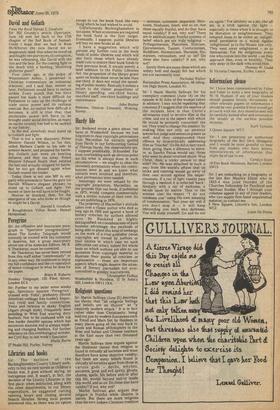Religious questions
Sir: Martin Sullivan (June 21) describes the theory that "all religious feelings and beliefs are an illusion" as "a relatively modern attack." It is in fact rather older than Christianity, being held not just by modern Europeans such as Freud and Marx but by thinkers in many places going all the way back to Greek and Roman philosophers in the West and Indian and Chinese teachers in the East more than two thousand years ago. Martin Sullivan then argues against the illusionist theory that religion is found in virtually all societies and must therefore have some objective validity. But there are many beliefs found in virtually all societies apart from those in various gods — devils, witches, sorcerers, good and evil spirits, ghosts, charms, spells, life before and/or after this life, worlds beyond and/or inside this world, and so on. Do these also have validity? If not, why not?
Martin Sullivan also argues that religion ' is fruitful while illusion is barren. But there are more religions than his own Judaeo-Christian tradition
— animism, totemism, paganism, Shintoism, Hinduism, Islam, and so on. Are these equally fruitful, and do they have equal validity? If not, why not? There are in addition many fruitful systems of belief which are not truly religious — Pythagoreanism, Platonism, Stoicism, Epicureanism, Taoism, Confucianism, Buddhism, Hermeticism, Marxism, Humanism, rationalism, and so on? Do these also have validity? If not, why not?
Surely there are many ideas which are widely held and deeply felt but which are not necessarily true. Nicholas Waiter Rationalist Press Association, 88 Islington High Street, London Ni.
Sir: I thank Martin Sullivan for his exemplary comment (June 14) on the episode in St John of the woman taken in adultery. I may not be repeating that comment if I suggest that the essence of the incident here is that Christ's adversaries tried to involve Him in the crime, and not in the aspect with which He would be primarily concerned: the sin. They tried to change His mission: by making Him not only an amateur lawyer but judge and sentence-passer as well. And they compounded their offence by hypocritically addressing Him as 'Teacher'. So He did in fact teach them giving them a dilemma to solve: or, as Sancho Panza would say, those who went to shear returned shorn. Was Christ, then, a tricky person to deal with? No. He was detached in such a way from the world's affairs that its tricks and cunning would go awry of their own accord against His imperviousness. If a ray of light cannot pass through a medium it is reflected 'back'. Similarly with a ray of darkness; it recoils upon its source. Thus to the woman also He meant "I do not condemn you" using His own meaning of condemnation, "but your sin will if you don't stop it — it will keep rebounding you back into darkness. You will stone yourself, Go and do not sin again." For adultery as a sin, like all sin, is a trick against the light — especially in times when it is thought to be liberation or enlightenment. They tempted Jesus to be either an 'enlightened' permissive or a moral rigidist 'enlightened' as to the Mosaic law only. They went away enlightened — as to themselves. For He enlightens every one who comes into the world — so they approach Him, even in hostility. They only stray in the dark who avoid Him.
Thomas W. Gadd 51 Victoria Crescent, Eccles, Lanes


































 Previous page
Previous page